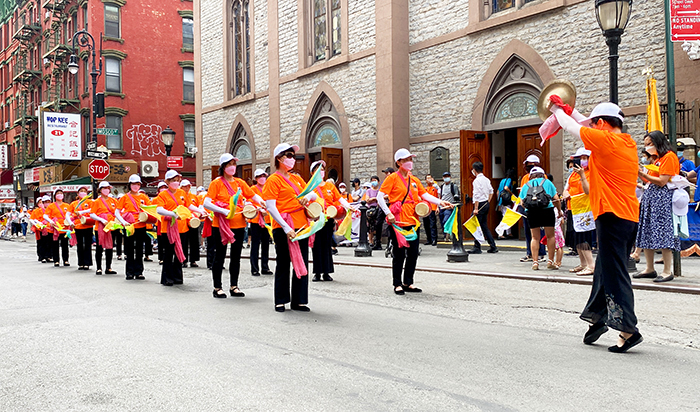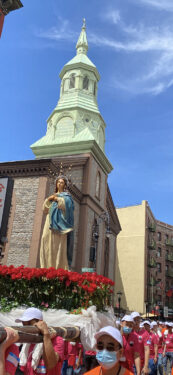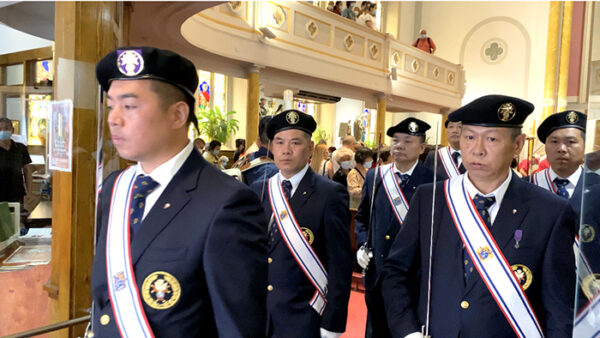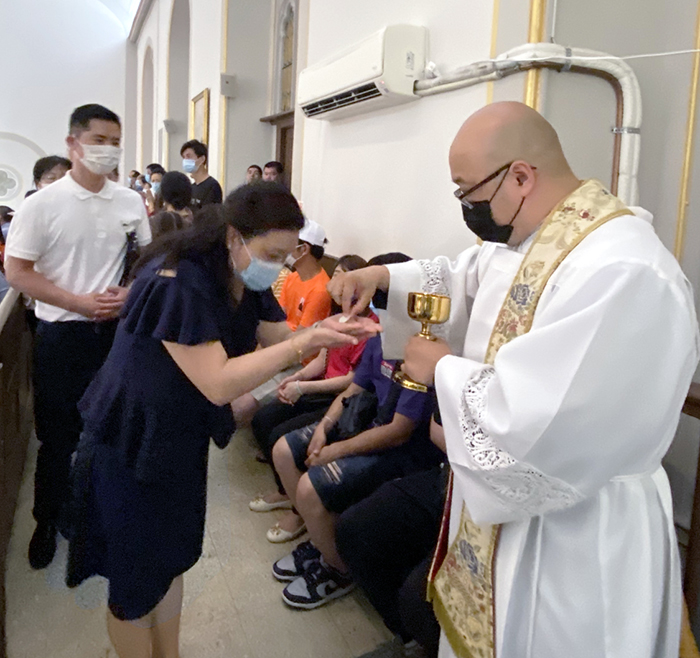
CHINATOWN — The Church of the Transfiguration pushed back Sunday, Aug. 14, against the pandemic’s lingering effects of a stagnant economy, Asian hate crimes, and continued grief for those who died from COVID complications.
More than 500 people filled the historic church on Mott Street for the parish’s 26th annual Assumption feast Mass and procession honoring Mary, Mother of Jesus.
It was the first Assumption feast procession since 2019. Since then, New York City has suffered about 2.7 million cases of COVID-19 and 41,322 deaths.
“This year, there still is a pandemic, but people are kind of getting back to normal,” said Karen Louie, a parishioner who helped organize the feast. “We felt we should do something to get the parishioners back.”

Father Roger Kwan, the administrator, said his parish has about 450 registered members, but 90% of them don’t live in Chinatown.
While the population of the neighborhood is estimated at about 100,000 people, most of Transfiguration’s members come from Brooklyn and Queens, including Louie, who is from Flushing.
She explained that church attendance lagged during the pandemic, but not just because of the disease.
“The majority of parishioners have to commute from somewhere,” Louie said. “We have a lot of elderly people. They can’t walk faster if something happens. So a lot of them don’t come out because they’re afraid of the subway.”
Father Kwan said the themes of this feast were praying for the intercession of Mary toward peace in Ukraine, an easing of tensions between China and Taiwan, and an end to the pandemic.
“This is a very important turning point in their lives,” he said. “It has been hard to bring people back together — all the groups that we used to have, all the meetings, all the societies. Now we’re slowly reviving, so the people are very hopeful.”
Pandemic’s Wake
Infection rates have fallen dramatically in recent months in New York City. According to data, the average daily death toll in New York City by Aug. 13 was 15 deaths per day — way down from 788 in mid-April 2020.
Still, nearly everyone at Sunday’s feast took the pandemic seriously and wore masks during Mass.
The 10002 ZIP code, which includes Chinatown and the Lower East Side, so far has a total death rate, as of Aug. 14, of 569 per 100,000 people, according to city health data. That statistic is higher than the death rate of 282 for all of Manhattan and 408 for all five boroughs.
The pandemic’s impact on the neighborhood’s economy got much attention in a study released last month by “Welcome to Chinatown,” a community nonprofit organization.
According to “Chinatown Impact Study (2022),” the neighborhood lost 57% of food service jobs — about 54,000 positions — compared to 45% citywide.
During those years, Chinatown lost 26% of total jobs, compared to 14% citywide. By comparison, 13% of jobs went away in Flushing, which also has a large community of Asian immigrants.
The study also shows that visits to the neighborhood were still down 50% in late 2021 from where it was in 2019. Tourism is picking up for the Chinese restaurants and retail shops, but these businesses, like the rest of the nation, are also facing 8% inflation rate.

The Mother Church
Father Kwan said many of the people at the feast find it more affordable to live outside New York City.
“They’re coming from places like deep in Pennsylvania or Delaware,” he said. “It’s cheaper because of the cost of living. A lot of them are blue-collar workers, restaurant workers, so they work six days a week.”
The parish was founded in 1827, but the church was built by Lutherans in 1801. The Archdiocese of New York bought it in 1853, and it became the home of Transfiguration Church. The parish now is mostly Chinese, with members who speak Mandarin or Cantonese.
“This is the mother parish of the Chinese community,” said Father Andrew Tsui, a concelebrant at the Mass.
Father Tsui grew up in the parish, so the feast for him was a homecoming. He was ordained in June and became the first American-born Chinese priest in the Diocese of Brooklyn. He is now parochial vicar at St. Bartholomew Parish in Elmhurst, Queens.
“So, a lot of us come back, even if we’re from different parts of the country, just for this event,” Father Tsui said. “It really is a family event because it’s an honor of our Blessed Mother.”
Yang Sciscent of Manhattan is a catechist for the parish. She has missed not having the feast and procession for the Assumption of Mary during the pandemic.
“This procession is not only our sincere faith,” she said. “We want to share her with the community around our church because we believe God teaches us to love our neighbors.
“So we share this woman. And she is always there on our behalf. We can be certain about that.”

